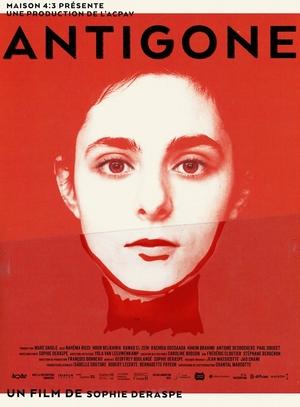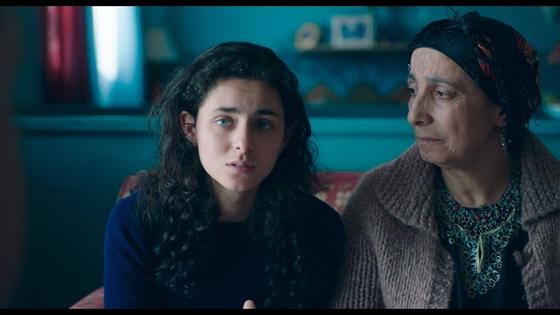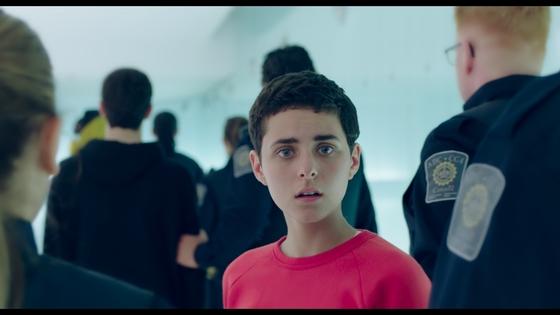

[Rating: Solid Rock Fist Up]
Coming to DVD, Blu-ray and VOD March 9, 2021.
Adaptions of ancient Greek theatre are nothing new in the world of cinema, but writer and director Sophie Deraspe innovates classical storytelling by merging the tragedy of Antigone through a modern social media lens.
Rooted more as a social drama rather than an identical adaptation, Deraspe’s Antigone finds success in its use of realism with cleverly crafted homages and tributes to Greek theater. As the traditional chorus is framed as a call to action by thousands online, Antigone explores themes of tragedy and the power of idealism to bring about social change. Capped with outstanding performances from the small French-speaking cast and a creative narrative structure full of eye-candy editing, Antigone proves to be the strongest Canadian contender for this year’s awards season.
Nahema Ricci stars as Antigone, a modest young woman from a close-knit Allergan family who fled to Montreal after the death of her parents. The stage is set early for the family’s strong bond with one another in the midst of their financial struggles. The household’s primary income stems from Antigone’s brother Polynice (Rawad El-Zein) and his local gang affiliation. After Polynice gets arrested and faces the threat of deportation, Antigone risks her future in helping Polynice escape from imprisonment. Faced heavily with internal struggles of personal responsibility and overcoming fate, audiences are left with Antigone during the most vulnerable and fearful moments of her young life.

Deraspe brilliantly threads the needle of finding a balance between adapting 2,000-year-old literature alongside a genuinely modern social drama. Finding moments to bring about the fantasy from Sophocles’ writings, Deraspe stays true to the original work while establishing the accident themes of grief and self-sacrifice in a modern setting. This balance is weaved through a hybrid rulebreaking narrative full of flashbacks, seemingly unrelated cutaway montages, and unsettling dream sequences. Antigone never loses its power as an insightful social drama, as it constantly keeps its messaging at the forefront of the work. The correlations to the past is enjoyable, but the film’s greatest strength is the harsh contemporary story it tells.
Antigone’s themes of self-sacrifice and perseverance speak to the unequal system of justice in Canada’s immigration program. The film critiques the policing of minority communities and the obstacles that refugees face. These issues are seen through the eyes of Antigone and her family, as Deraspe’s direction establishes a personal connection between the audience and the characters. Little backstory is needed as Deraspe introduces her characters and relationships through tender moments of love for each other. Dancing scenes that start the film, create a personal build that simple explanations could not do justice. As one is lead to feel sympathy for the tragedies Antigone bears and the sacrifices she makes, Deraspe hooks audiences early on to signify motives that audiences can strongly relate to.
Traditionally, escape films are embedded in drama to lead to the grandiose moment of release and victory. The narrative structure of escape films is almost universally that of a trial and error build that leads to an explosive climax where an individual finds their freedom. Antigone twists these conventions by changing up the escape film narrative formula and having the big escape take place near the end of the first act.
As in life, there is no black and white line between freedom and confinement. Though a character might be “free” they are never truly free from the social complications of their life as an immigrant. Deraspe brings this about, in having the drama of the film’s escape take a backseat to the drama brought about through the social realistic approach. Brave faces and genius maneuvers are replaced with a fearful tone and a hail-mary attempt with drastic consequences, regardless of the outcome. As the film generates its strength in these crucial scenes, it transitions into the second half where the raised issues are on display in full effect.

Though admirable throughout, Antigone is not without its flaws. The film’s sporadic nature helps energize the narrative structure of an adaption but never grounds itself enough for all of its messages and scenes to hit as intended. Not mosaic enough to forget about the story and character-driven dialogue, there are times the lack of a build makes scenes feel pointless as it moves from one to the next. The central story occasionally gets buried in filler seemingly without a point.
Ricci gives an unorthodox yet star-making performance in Antigone. The evolution of her character is the guiding force of the film and Ricci captures it close to perfection. Beginning in a minimal style, where silent shots of facial expressions convey the comfort and pain of Antigone, Ricci brilliantly portrays the journey into mental angst that self-sacrifice into loneliness can bring about. Antigone is always likable due to Ricci’s performance and the moments of emotional breakdown are always earned as Ricci never fails to deliver soul-crushing drama while maintaining the film’s realism.





Comments on this entry are closed.